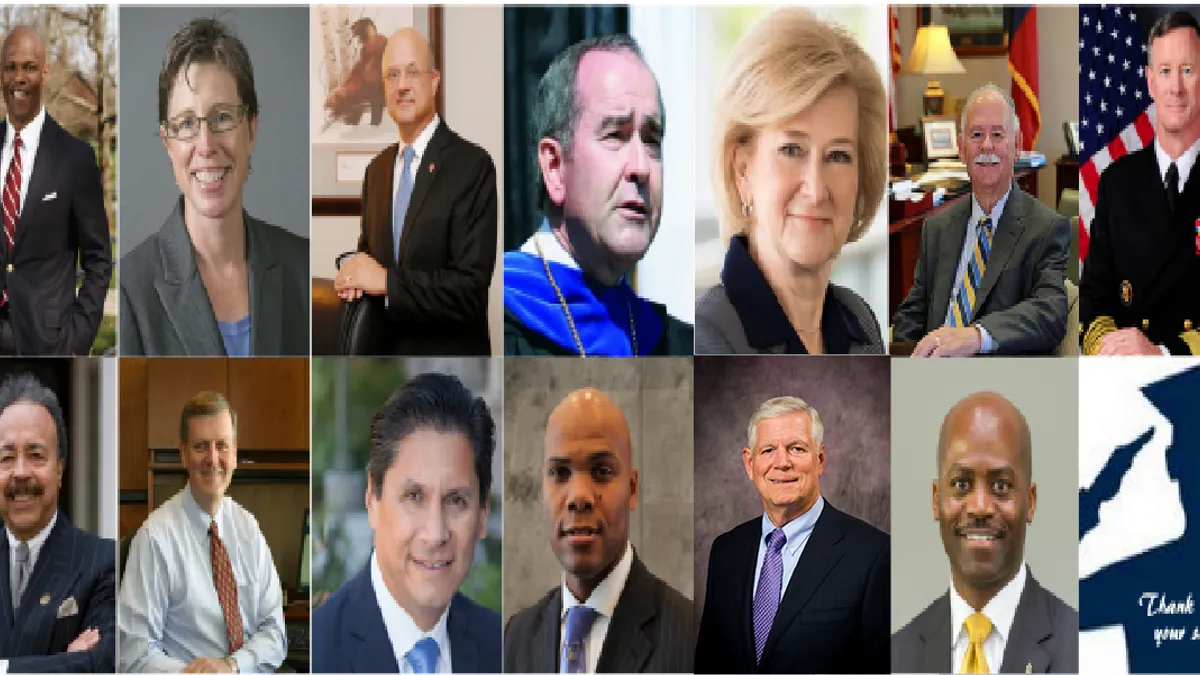Editor's note: This piece was updated November 13, 2017. It originally ran November 11, 2016.
For many academic traditionalists, the military may seem an unlikely route to the college presidency — unless you’re looking to lead a military university. But in many instances, the discipline and balance that make one a successful serviceman or woman translate into exactly the type of leadership needed to guide an academic institution.
1. Christopher Howard, Robert Morris University
In 2003, Howard earned the bronze star in 2003 for his service in Afghanistan. During his active duty career, he served as a helicopter pilot and an intelligence operations and plans officer with the elite Joint Special Operations Command. Howard also earned the Joint Service Commendation and NATO Medal for his service in Bosnia.
2. Elizabeth L. Hillman, Mills College
Hillman is a former officer in the U.S. Air Force, and has earned national and international acclaim for her work on military gender issues. She was appointed by the Ranking Member on the U.S. House of Representatives Armed Forces Committee to the Response Systems Adult Sexual Assault Crimes Panel and she chaired a Department of Defense Committee on sexual assault. Hillman was also instrumental in the takedown of “Don’t Ask, Don’t Tell” and has advised on issues such as allowing women in combat and ending discrimination of transgender individuals in the military.
3. Robert E. Clark, Wesley College
Clark is a retired Navy captain who served 32 years in the Navy’s Submarine Force. His appointments included commodore of Submarine Squadron Four, commanding officer of the nuclear-powered submarine USS Connecticut and executive assistant to the vice chief of Naval Operations. He is also the longest-standing commandant of in the history of the U.S. Naval Academy, where he led midshipmen from April 2010 to May 2013.
4. Ronald Lingle, Coastal Carolina Community College
Lingle served as an Army medical evacuation helicopter pilot in the Vietnam War, and his wife, Cheryl, served as an Army nurse. The pair met at the Army medical training center in San Antonio, Texas, and married just a week after they both returned home from the war in 1972. He plans to retire at the end of this year after 28 years of service at the institution.
5. Ann Rondeau, College of DuPage
Rondeau was the second woman to achieve the rank of three-star admiral in the U.S. Navy. She is a former Deputy Commander of the U.S. Transportation Command in Illinois, and served as Pentagon Director/Chief of Staff for the U.S. Navy Staff, Commander of the Navy Personnel Development Command in Virginia, Commander of the Naval Service Training Command at Great Lakes, IL., Pacific Fleet Staff Chief of Staff in Hawaii, and Commanding Officer of Naval Support Activity in Tennessee prior to her retirement in 2012. She is also a past president of National Defense University.
6. Steven H. Tallant, Texas A&M University-Kingsville
Tallant left the U.S. Navy in 1973 after four years of service, only to re-enter the military as a commissioned officer of the U.S. Air Force in 1978. The last assignment of his 16-year Air Force career was as chief of Air Force Family Research at the Pentagon.
7. William R. Harvey, Hampton University
Harvey is one of the longest-tenured presidents in the U.S., with 38 years at the helm of Hampton University, and is currently a lieutenant colonel in the Army Reserve. He served three years as active duty Army after completing his bachelor’s degree.
8. Thomas J. Haas, Grand Valley State University
Haas served 23 years of commissioned service for the U.S. Coast Guard and retired as a captain. He has been president of GVSU since 2006.
9. Eloy Ortiz Oakley, Long Beach Community College District
Oakley is the first Latino chancellor of the 113-college system, the largest in the U.S. He enlisted in the U.S. Army after high school and served for four years.
10. Herman J. Felton, Wilberforce University
Felton served nearly eight years in the U.S. Marine Corps. A Parris Island Marine, he served as both an embarkation and logistics clerk Japan and at Camp Lejeune and as a Marine recruiter.
11. William McRaven, University of Texas System
McRaven is now the UT system Chancellor and a retired U.S. Navy four-star admiral, well-known for leading the nation's Special Operations Command during Operation Neptune Spear — or the raid which led to the death of Osama bin Laden. He'd previously served as Commander of the Joint Special Operations Command and from June 2006 to March 2008 as Commander, Special Operations Command Europe, and served as the first director of the NATO Special Operations Forces Coordination Centre.
12. Anthony Jenkins, West Virginia State University
Jenkins is a United States Army veteran and has a background in criminal justice, sociology and educational leadership and policy studies. Prior to his career in higher education, Jenkins served in the United States Army as an Air Defense Artillery Specialist.
13. Richard B. Myers, Kansas State University
Myers, a retired U.S. Air Force general, served as chairman of the Joint Chiefs of Staff from 2001-2005. He also served as commander of the North American Aerospace Defense Command; U.S. Space Command and Air Force Space Command at Peterson Air Force Base in Colorado and Pacific Air Forces at Hickam Air Force Base, Hawaii; and the 5th Air Force at Yokota Air Base, Japan. Myers' Air Force career began when he joined the ROTC program at Kansas State as a student in the 1960s.
Shalina Chatlani contributed to this piece.


















